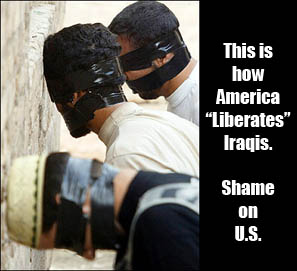
Theology of War
on this page:
Quotes about war and peace
Peace loving nation?
A New Confession of Christ
A War about Truth
The Real Conflict
Other Ways We Kill
Cheney's Song of America
A soldier speaks out against war

"It must be admitted therefore that if the gospel of peace is no longer convincing on the lips of Christians, it may well be because they have ceased to give a living example of peace, unity and love. True, we have to understand that the Church was never intended to be absolutely perfect on earth, and she is a Church of sinners, laden with imperfection. Christian peace and Christian charity are based indeed on this need to ‘bear one another’s burdens,’ to accept the infirmities that plague one’s own life and the lives of others. Our unity is a struggle with disunity and our peace exists in the midst of conflict." - Thomas Merton
 "We often think of peace as the absence of war; that if the powerful countries would reduce their arsenals, we could have peace. But if we look deeply into the weapons, we see our own minds - our prejudices, fears, and ignorance. Even if we transported all the bombs to the moon, the roots of war and the reasons for bombs would still be here, in our hearts and minds, and sooner or later we would make new bombs.
"We often think of peace as the absence of war; that if the powerful countries would reduce their arsenals, we could have peace. But if we look deeply into the weapons, we see our own minds - our prejudices, fears, and ignorance. Even if we transported all the bombs to the moon, the roots of war and the reasons for bombs would still be here, in our hearts and minds, and sooner or later we would make new bombs.
Seek to become more aware of what causes anger and separation, and what overcomes them. Root out the violence in your life, and learn to live compassionately and mindfully. Seek peace. When you have peace within, real peace with others will be possible." - Thich Nhat Hanh
But we have stood on this earth in false pathos, in false security; in our spiritual insanity we really believed we could, with the power of our own hand and arm, bring the stars down from heaven and kindle flames of eternity in the world. We believed we could harness everything and fit it into a final order that would stand.
Space is still filled with the noise of destruction and annihilation, the shouts of self-assurance and arrogance, the weeping of despair and helplessness. But just beyond the horizon the eternal realities stand silent in their age-old longing. There shines on us the first mild light of the radiant fulfillment to come. From afar sound the first notes as of pipes and singing children, not yet discernible as a song or melody. It is all far off still, and only just announced and foretold. But it is happening. - Alfred Delp, a Jesuit priest condemned as a traitor for his opposition to Hitler, wrote this piece in a Nazi prison shortly before he was hanged in 1945.
read more thoughts on nonviolence
"We are a peace-loving nation." Oh really?
Countries that the United States has bombed since the end of World War II: China, 1945-1946; Korea, 1950-1953; China, 1950-1953; Guatemala, 1954; Indonesia, 1958; Cuba, 1959-1960; Guatemala, 1960; Congo, 1964; Peru, 1965; Laos, 1964-1973; Vietnam, 1961-1973; Cambodia, 1967-1970; Guatemala, 1967-1969; Grenada, 1983; Libya, 1986; El Salvador, 1980s; Nicaragua, 1980s; Panama, 1989; Iraq 1991-2000, and 2002-present; Sudan, 1998; Afghanistan, 1998, and 2001-present; Yugoslavia, 1999.
Killing by the Numbers:
20% Maximum rate of U.S. soldiers who shot to kill while under fire during World War II
55% Firing rate in the Korean War, due to "improved" psychological conditioning by the military
95% Firing rate in the Vietnam War
16% Rate of U.S. veterans from the Iraq war who suffer from depression or post-traumatic stress disorder
Source: Christian Science Monitor
A New Confession of Christ
by Jim Wallis
Because of a deep and growing concern about an emerging "theology of war" in the White House, the increasingly frequent language of "righteous empire," and official claims of "divine appointment" for a nation and president in the "war" on terrorism, I have joined with several theologians and ethicists in writing the following statement. A climate in which violence is too easily accepted, and the roles of God, church, and nation too easily confused calls for a new "confession" of Christ. The statement names five key points of Jesus' teachings, while rejecting false teachings that nullify his message. It has been signed by more than 200 theologians and ethicists - many of them from theologically conservative seminaries and Christian colleges. We share it with you and ask that you send it to friends and present it to your churches if you resonate with its concerns and convictions.
Confessing Christ in a World of Violence
Our world is wracked with violence and war. But Jesus said: "Blessed are the peacemakers, for they shall be called the children of God" (Matt. 5:9). Innocent people, at home and abroad, are increasingly threatened by terrorist attacks. But Jesus said: "Love your enemies, pray for those who persecute you" (Matt. 5:44). These words, which have never been easy, seem all the more difficult today.
Nevertheless, a time comes when silence is betrayal. How many churches have heard sermons on these texts since the terrorist atrocities of September 11? Where is the serious debate about what it means to confess Christ in a world of violence? Does Christian "realism" mean resigning ourselves to an endless future of "pre-emptive wars"? Does it mean turning a blind eye to torture and massive civilian casualties? Does it mean acting out of fear and resentment rather than intelligence and restraint?
Faithfully confessing Christ is the church's task, and never more so than when its confession is co-opted by militarism and nationalism.
- A "theology of war," emanating from the highest circles of American government, is seeping into our churches as well.
- The language of "righteous empire" is employed with growing frequency.
- The roles of God, church, and nation are confused by talk of an American "mission" and "divine appointment" to "rid the world of evil."
 The security issues before our nation allow no easy solutions. No one has a monopoly on the truth. But a policy that rejects the wisdom of international consultation should not be baptized by religiosity. The danger today is political idolatry exacerbated by the politics of fear.
The security issues before our nation allow no easy solutions. No one has a monopoly on the truth. But a policy that rejects the wisdom of international consultation should not be baptized by religiosity. The danger today is political idolatry exacerbated by the politics of fear.
In this time of crisis, we need a new confession of Christ.
1. Jesus Christ, as attested in Holy Scripture, knows no national boundaries. Those who confess his name are found throughout the earth. Our allegiance to Christ takes priority over national identity. Whenever Christianity compromises with empire, the gospel of Christ is discredited.
We reject the false teaching that any nation-state can ever be described with the words, "the light shines in the darkness and the darkness has not overcome it." These words, used in scripture, apply only to Christ. No political or religious leader has the right to twist them in the service of war.
2. Christ commits Christians to a strong presumption against war. The wanton destructiveness of modern warfare strengthens this obligation. Standing in the shadow of the Cross, Christians have a responsibility to count the cost, speak out for the victims, and explore every alternative before a nation goes to war. We are committed to international cooperation rather than unilateral policies.
We reject the false teaching that a war on terrorism takes precedence over ethical and legal norms. Some things ought never be done - torture, the deliberate bombing of civilians, the use of indiscriminate weapons of mass destruction - regardless of the consequences.
3. Christ commands us to see not only the splinter in our adversary's eye, but also the beam in our own. The distinction between good and evil does not run between one nation and another, or one group and another. It runs straight through every human heart.
We reject the false teaching that America is a "Christian nation," representing only virtue, while its adversaries are nothing but vicious. We reject the belief that America has nothing to repent of, even as we reject that it represents most of the world's evil. All have sinned and fallen short of the glory of God (Rom. 3:23).
4. Christ shows us that enemy-love is the heart of the gospel. While we were yet enemies, Christ died for us (Rom. 5:8, 10). We are to show love to our enemies even as we believe God in Christ has shown love to us and the whole world. Enemy-love does not mean capitulating to hostile agendas or domination. It does mean refusing to demonize any human being created in God's image.
We reject the false teaching that any human being can be defined as outside the law's protection. We reject the demonization of perceived enemies, which only paves the way to abuse; and we reject the mistreatment of prisoners, regardless of supposed benefits to their captors.
5. Christ teaches us that humility is the virtue befitting forgiven sinners. It tempers all political disagreements, and it allows that our own political perceptions, in a complex world, may be wrong.
We reject the false teaching that those who are not for the United States politically are against it or that those who fundamentally question American policies must be with the "evil-doers." Such crude distinctions, especially when used by Christians, are expressions of the Manichaean heresy, in which the world is divided into forces of absolute good and absolute evil.
The Lord Jesus Christ is either authoritative for Christians, or he is not. His Lordship cannot be set aside by any earthly power. His words may not be distorted for propagandistic purposes. No nation-state may usurp the place of God.
We believe that acknowledging these truths is indispensable for followers of Christ. We urge them to remember these principles in making their decisions as citizens. Peacemaking is central to our vocation in a troubled world where Christ is Lord.
A War about Truth This war (like all major wars) is fundamentally spiritual. I sometimes feel as if my puny brain is the battleground for all these battles. I can’t remain aloof because there’s no happiness for me in so doing, because there’s no happiness without truth—and this war is essentially a war about truth. Every false throne must first crack and splinter, that’s the distressing thing, before the genuine can appear in unadulterated form. I mean that personally and spiritually, not politically. - Hans Scholl (Beheaded in Munich on February 22, 1943, for his involvement in anti-Nazi activities. He was 24.)
The Real Conflict No one in the world can change truth. What we can and should do is seek truth and serve it when we have found it. The real conflict is within. Beyond the armies of occupation and the hectacombs of the extermination camps, two irreconcilable armies lie in the depth of every soul. And of what use are the victories of the battlefield if we are defeated in our innermost selves? - Father Maximillian Kolbe (Polish priest, murdered at Auschwitz in 1941)

Other Ways We Kill "We kill at every step, not only in wars, riots, and executions. We kill when we close our eyes to poverty, suffering, and shame. In the same way all disrespect for life, all hard-heartedness, all indifference, all contempt is nothing else than killing. With just a little witty skepticism we can kill a good deal of the future in a young person. Life is waiting everywhere, the future is flowering everywhere, but we only see a small part of it and step on much of it with our feet." - Hermann Hesse, German poet and novelist
click to the LiberalWare Poverty section
click to the LiberalWare Values section
Cheney's Song of America
What's really going on? This document, now entered into the congressional record, offers some disturbing and compelling clues. Click here to read the full text.
From Cheney's Song of America (paragraph three): The Plan is for the United States to rule the world. The overt theme is unilateralism, but it is ultimately a story of domination. It calls for the United States to maintain its overwhelming military superiority and prevent new rivals from rising up to challenge it on the world stage. It calls for dominion over friends and enemies alike. It says not that the United States must be more powerful, or most powerful, but that it must be absolutely powerful.
"Peace has never come from dropping bombs. Real peace comes from enlightenment and educating people to behave in a more divine manner." - Carlos Santana

return to reinform.org main page



 "We often think of peace as the absence of war; that if the powerful countries would reduce their arsenals, we could have peace. But if we look deeply into the weapons, we see our own minds - our prejudices, fears, and ignorance. Even if we transported all the bombs to the moon, the roots of war and the reasons for bombs would still be here, in our hearts and minds, and sooner or later we would make new bombs.
"We often think of peace as the absence of war; that if the powerful countries would reduce their arsenals, we could have peace. But if we look deeply into the weapons, we see our own minds - our prejudices, fears, and ignorance. Even if we transported all the bombs to the moon, the roots of war and the reasons for bombs would still be here, in our hearts and minds, and sooner or later we would make new bombs. The security issues before our nation allow no easy solutions. No one has a monopoly on the truth. But a policy that rejects the wisdom of international consultation should not be baptized by religiosity. The danger today is political idolatry exacerbated by the politics of fear.
The security issues before our nation allow no easy solutions. No one has a monopoly on the truth. But a policy that rejects the wisdom of international consultation should not be baptized by religiosity. The danger today is political idolatry exacerbated by the politics of fear.